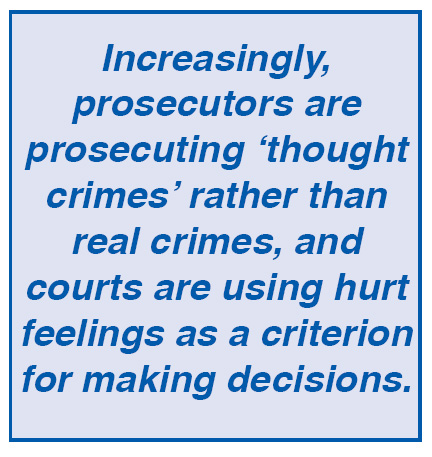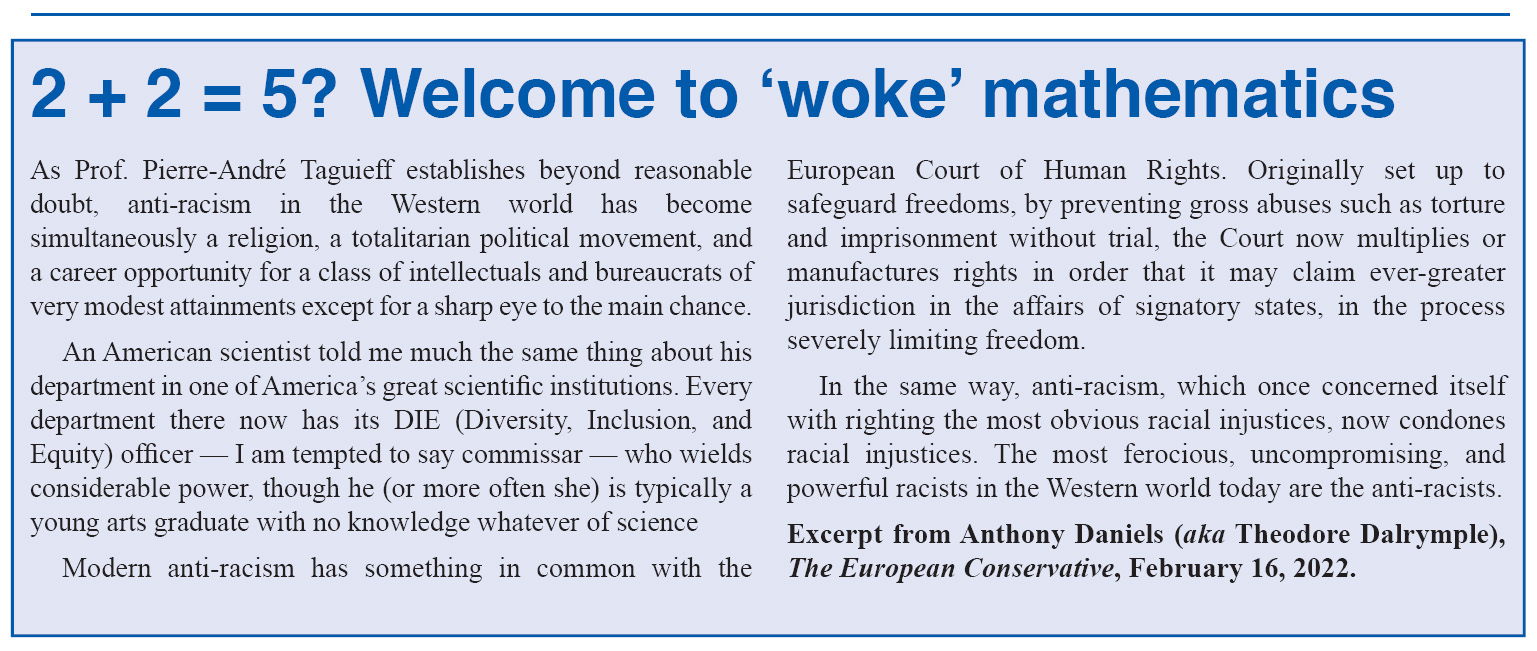Freedom of religion on trial in Finland
by William Kilpatrick
Will Finland bow down to the gods of fashion?
Päivi Räsänen is a member of the Finnish Parliament, a former minister of the interior, a public speaker and the mother of five grown children.
She faces a heavy fine and two years in prison for quoting the Bible. In response to the Evangelical Lutheran Church's
affiliation with the Helsinki LGBT Pride event, she posted
the Bible passage from Romans 1: 24–27 which condemns
homosexual behaviour.
the Bible. In response to the Evangelical Lutheran Church's
affiliation with the Helsinki LGBT Pride event, she posted
the Bible passage from Romans 1: 24–27 which condemns
homosexual behaviour.
Finnish prosecutors stated that the use of the word "sin" could be harmful, and alleged that Ms. Räsänen's comments were made to cause intolerance, contempt and hatred toward homosexuals (Fox News, February 16, 2022).
But couldn't the prosecutor's remarks cause intolerance, contempt and hatred toward Ms. Räsänen? If criticising another person's beliefs or behaviour is a hate crime, then isn't she the victim of a hate crime?
The court prosecutors worried that the word "sin" could be harmful. One supposes they mean harmful to one's self-esteem. And, indeed, the list of sins in Romans 1: 24–32 is meant to make you feel bad about yourself. From a Biblical perspective, acknowledgment of sin, followed by repentance, leads on to salvation. In other words, feeling bad about your behaviour is, in some cases, a good thing.
It's not only homosexual behaviour that is condemned in Romans 1. The extended passage condemns all manner of sins including idolatry, deceitfulness, envy, gossip, slander, and disobedience to parents.
From one point of view this is highly offensive and insulting to those disposed to deceitfulness and slander. From another point of view, it can be looked upon as highly therapeutic — a moment of self-recognition that leads on to change.
Prosecutors should have no difficulty understanding the
concept. After all, they apply painful therapeutics as a matter of
course. They hope that a heavy fine or a dose of prison will force
the criminal to recognise his crimes and put himself on the road  to rehabilitation.
to rehabilitation.
Increasingly, however, prosecutors are prosecuting "thought crimes" rather than real crimes, and courts are using hurt feelings as a criterion for making decisions.
Take the case of Elisabeth Sabaditsch-Wolff, an Austrian woman who was found guilty of "inciting hatred" by an Austrian Court because of her assertion that the prophet Muhammad was a paedophile. In 2018, the ruling was upheld by the European Court of Human Rights which held that her right to freedom of expression was outweighed by "the right of others to have their religious feelings protected" (Jihad Watch, October 27, 2018). In short, feelings trumped facts, and the alleged pain caused to Muslims by the "slander" of their prophet became the deciding factor.
Interestingly, the case of Päivi Räsänen also involves "religious feelings" — her feeling or, rather, her conviction that Lutherans should be guided by the words of St. Paul rather than by the fashions of the day.
But although the feelings of Muslims still count for quite a bit in Europe, it seems likely that the Christian "feelings" of Ms. Räsänen will count for very little against the supposedly great pain homosexuals feel when they read the words of St. Paul in Romans. The Finns will probably be hearing a great deal in the near future about the harm that Christianity causes to homosexuals, transgenders and other favoured sexual minorities.
So, just as Muslims must be protected from Islamophobia, homosexuals must be protected from homophobia. Whether or not the free speech rights of Christians get trampled in the process doesn't seem to matter much to European elites.
But if the rights of homosexuals clash with the rights of Muslims, what happens then?
Well, if you understand how the hierarchy of feelings is structured, you'll quickly realise that — all things being equal — Muslim feelings will prevail. For example, a Birmingham, England primary school stopped lessons normalising same-sex relationships when hundreds of Muslim parents protested (The Guardian, UK, March 5, 2019).
This is in contrast to the attitude of schools in the UK toward non-Muslim parents. Such parents can expect to be ignored completely when they complain about sex-ed. It's not that the Muslim protests were threatening: they weren't. It's just that the Muslim population of Birmingham is thirty per cent and rising. And if you're given the choice of offending the city's gay population or its Muslim population, you'll probably choose to do the former.
Meanwhile, in Helsinki the top priority is criminalising Saint Paul's "offensive" letter to the Romans. But if the Finns had
looked over their border to the rest of the Continent, they might
have noticed that homosexuals in Europe worry very little about
St. Paul and very much about the growing number of Muslim
gangs in cities and suburbs.
Paul's "offensive" letter to the Romans. But if the Finns had
looked over their border to the rest of the Continent, they might
have noticed that homosexuals in Europe worry very little about
St. Paul and very much about the growing number of Muslim
gangs in cities and suburbs.
In Brussels according to Bianca Debaets, the former Belgian Secretary of State, "there are too many areas where it is difficult for women and homosexuals to walk" (Gatestone Institute, New York, January 16, 2022). That may be because the Muslim percentage of the population of Brussels is now between 25–30 per cent. Perhaps, you may think, homosexuals in Brussels should consider moving to close-by Amsterdam which has traditionally been a haven for gays. But the Muslim population of Amsterdam has also been growing, and as Amsterdam becomes more like the real Mecca, it is no longer the Mecca for gays that it once was. As a result, many gays have moved out.
 In short, while European elites claim to be fighting
homophobia, they are doing little to resist the gradual takeover
of Europe by the most homophobic culture on the planet. A
similar contradiction can be found in the attitude of European
officials toward anti-Semitism. On the one hand, they tell us it's
a very bad thing. On the other hand, they welcome waves of
immigrants from cultures that are steeped in anti-Semitism.
In short, while European elites claim to be fighting
homophobia, they are doing little to resist the gradual takeover
of Europe by the most homophobic culture on the planet. A
similar contradiction can be found in the attitude of European
officials toward anti-Semitism. On the one hand, they tell us it's
a very bad thing. On the other hand, they welcome waves of
immigrants from cultures that are steeped in anti-Semitism.
These schizoid policies suggest that European leaders are seriously confused. Indeed, many of the Western experts and authorities that we once relied on for guidance are now in the grip of deep delusions about obvious realities. I refer to politicians, teachers, health professionals, and media commentators who insist that men can become pregnant, that women can become men, and that a union between two men is no different than a marriage between a man and a woman.
It's ironic that some of these gullible types in Helsinki are now in a position to criminalise a passage in the Bible. It's ironic because the chapter from Romans that most offends them not only criticises idolatry and homosexuality, it also criticises the foolish thinking of the time which passed for wisdom among the elites.
But what Paul said about the supposed wise men of his day applies even more fittingly to the supposed wise men of our own age. Here's a sample: "So they are without excuse, for although they knew God, they did not honour him as God or give thanks to him, but they became futile in their thinking and their senseless minds were darkened. Claiming to be wise, they became fools…" (Romans 1: 20–22).
You can see why the authorities want to cancel Paul. The fashionable ideas they want people to bow down before are just as foolish as the once-fashionable idea of worshiping birds and reptiles. Yet, for opposing the present foolishness, Päivi Räsänen now faces prison time.
William Kilpatrick is the author of
Christianity, Islam, and Atheism: The
Struggle for the Soul of the West (2015)
and What Catholics Need to Know about
Islam (2020) and other books about
culture and religion. The above article is
reprinted, with the author's permission,
from FrontPageMag.com (February 25, 2022). For more on
William Kilpatrick's work and writings, visit his website,
TurningPointProject.com. ![]()

